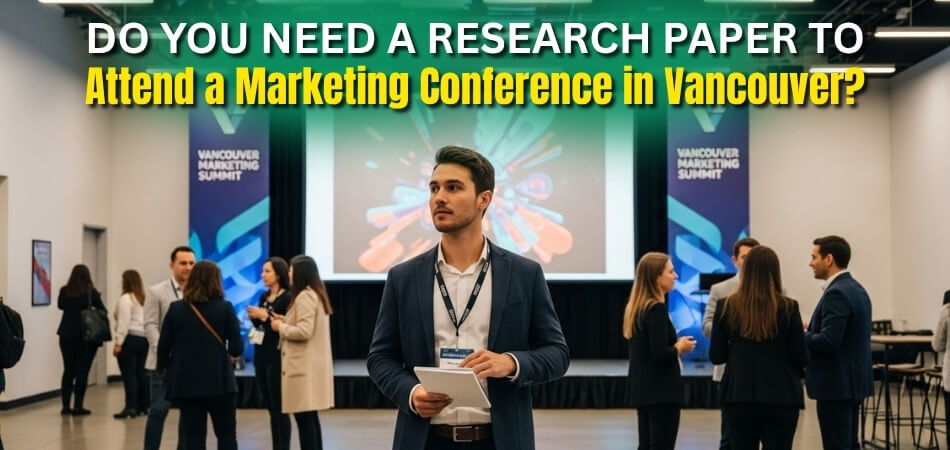Marketing conferences are exciting opportunities where professionals, students, and entrepreneurs come together to share ideas, build networks, and learn about industry trends. Whether you are a first-time attendee or a seasoned participant, the thought of presenting research often creates confusion.
Do You Need a Research Paper to Attend a Marketing Conference in Vancouver is a question many people ask before registering. The straightforward answer is no, unless you are applying as a presenter or attending a research-heavy academic event. Most industry-focused gatherings welcome attendees without requiring any paper submissions.
This means you can still benefit from inspiring sessions, workshops, and valuable networking without worrying about preparing academic work. Continue reading to discover how these conferences work and how you can make the most out of your experience.
Do You Need a Research Paper to Attend a Marketing Conference in Vancouver?
Many participants assume a research paper is mandatory to attend a marketing conference. In reality, most industry-focused events allow professionals, students, and business leaders to participate without any submission requirements. Only in academic-oriented conferences might papers be necessary, especially if you intend to present research or findings.

For newcomers, this distinction is important. Understanding who needs a paper and who doesn’t removes hesitation and makes conferences more approachable. Whether you want to network, gain insights, or showcase research, there is a place for everyone in these events.
Explore the opportunities and take your next step toward attending confidently.
General Attendees: No Paper Needed
Most marketing conferences welcome general attendees without requiring a research paper. Professionals, entrepreneurs, and students can register, attend keynote sessions, and engage in networking opportunities freely. This makes conferences accessible to anyone looking to gain insights into marketing trends without the pressure of academic submissions.
Presenters: Paper Submission Required
Those aiming to deliver presentations or workshops usually need to submit a research paper or case study. Papers are reviewed by organizers before acceptance, ensuring quality contributions. By submitting, presenters secure a spot on the program and gain a chance to share ideas, research, or practical strategies with a broader audience.
Researchers or Students: Academic Requirements Possible
Academic-focused conferences sometimes request papers from researchers or students to validate scholarly participation. Submitting offers opportunities to publish in journals or conference proceedings. While not mandatory for attendance, contributing a paper can boost academic profiles, provide recognition, and help participants actively engage in specialized discussions within the marketing community.
Identifying Paper Requirements
Conference websites usually provide clear instructions through a “call for papers” or “submission guidelines.” If these sections are highlighted, it signals that papers are needed for presentation slots. If not, attendees can generally register and participate without submitting academic work. Checking these details removes any confusion before registering.
Why This Distinction Matters
Many students and professionals hesitate to register because they assume a paper is compulsory. This misconception limits participation. For example, a professional marketing summit in Vancouver may not need papers, while an academic marketing research event could invite submissions. Knowing the difference encourages broader involvement and ensures people don’t miss valuable opportunities.
Submitting a research paper is only necessary if you plan to present or attend an academic-focused event. For most conferences in Vancouver, attendees can participate freely without academic obligations. Recognizing this difference empowers students, professionals, and researchers to make informed choices and confidently benefit from the experience.
Why Some Conferences Require Research Papers?
Some conferences place emphasis on academic contributions, making research papers an essential part of participation. These events focus on scholarly dialogue, peer-reviewed work, and publishing opportunities. For participants seeking recognition or academic growth, research papers are vital.
Consider your goals carefully before selecting the type of conference to attend.
Academic vs Industry Focus
Academic conferences often require peer-reviewed submissions to ensure quality and credibility, while industry conferences prioritize real-world strategies and professional networking. This distinction shapes the participant’s role and expectations. Knowing which type you are registering for helps avoid confusion and ensures that your preparation aligns with the event’s objectives.
Credibility and Recognition
Submitting a research paper lends credibility to both the participant and the event. Papers demonstrate originality, analytical skills, and contributions to the field. Selected submissions may be recognized publicly during presentations, giving authors visibility within their professional community and helping them establish authority among peers and potential collaborators.
Publishing Opportunities
Some conferences offer the chance to publish accepted research papers in journals or conference proceedings. This is highly valuable for students and academics aiming to build their professional portfolio. Beyond recognition, publication provides long-term benefits by contributing to career advancement and making the research accessible to a wider audience.
Knowledge Sharing Platform
Research papers help conferences serve as platforms for knowledge exchange. Presenters share findings that spark discussions and influence future research directions. Attendees benefit by engaging with cutting-edge insights instead of general concepts. This cycle of presentation and feedback strengthens the academic community and ensures meaningful dialogue among participants.
Local Example in Vancouver
Certain international marketing research summits in Vancouver may request paper submissions to ensure an academic component, while industry-focused expos do not. These academic events provide researchers and students with an avenue to present findings, while professionals attending industry events can focus on gaining insights and building professional networks without submission requirements.
Research papers are essential in academic-focused events, but they are not a barrier for attending industry marketing conferences. Understanding whether a conference values peer-reviewed contributions or practical insights helps participants prepare properly.
How to Decide If You Should Submit a Paper or Just Attend?
Deciding whether to submit a paper or simply attend depends on your goals, role, and available time. Both choices bring valuable outcomes, but the right path comes from matching your expectations with what the conference offers. Choose the option that aligns best with your professional or academic aspirations.
Submitting a Paper Builds Authority
Sharing a research paper helps establish you as an expert in your field. It provides recognition among peers, may lead to publishing opportunities, and enhances academic or professional credibility. This option suits those aiming for visibility, career advancement, or contributing original insights to the conference program.
Attending Without a Paper Provides Flexibility
Joining as an attendee allows you to focus on learning, networking, and gaining exposure to industry trends. Without the pressure of paper preparation, you can engage freely in sessions, workshops, and discussions. This choice is ideal for professionals and students who want practical knowledge and connections over academic recognition.
Time Availability Guides the Choice
Preparing a paper demands significant effort, from drafting and revising to meeting strict deadlines. If you lack the time or resources to commit, attending without presenting may be more realistic. Evaluating your schedule ensures participation remains stress-free while still offering meaningful benefits from the overall conference experience.
A Simple Checklist Helps Clarity
- Define your main goals: recognition, learning, or networking.
- Confirm your role: student, researcher, or professional.
- Assess your preparation time: enough for paper writing or limited for attendance.
This checklist allows you to decide confidently whether submitting or simply attending will serve your needs best.
Both submitting a paper and attending without one bring value. Researchers and academics gain recognition through presenting, while professionals and students benefit greatly from attending and networking. By reviewing your goals and available time, you can confidently select the path that ensures the most rewarding conference experience.
Common Myths About Research Papers and Conferences
Misconceptions about research paper requirements often discourage people from attending conferences. These myths create unnecessary hesitation for students and professionals alike. Clearing up false assumptions helps participants feel confident in registering and makes conferences more inclusive for everyone. Let go of the myths and focus on opportunities that truly matter.
Not Every Conference Requires a Paper
Many believe that all conferences demand research papers, but this is not true. Most marketing conferences welcome attendees without requiring submissions. Academic-focused events may invite papers, while industry conferences prioritize insights, networking, and practical knowledge. Understanding this distinction eases concerns and encourages participation without added academic obligations.
Registration Fees Do Not Replace Submissions
Paying conference fees secures entry but does not substitute for paper requirements in academic events. Submissions are reviewed separately, ensuring quality contributions. Believing that fees automatically cover academic responsibilities is misleading. Participants should always check submission guidelines to know whether a paper is truly necessary for their chosen role.
Invitations Do Not Always Mean Papers
Receiving a conference invitation does not guarantee that a research paper is expected. Many invitations are extended to broaden participation, especially in professional gatherings. Attendees can often register and engage without submitting work. This clears up confusion for first-time participants who mistakenly believe invitations always involve academic obligations.
Myths Discourage Potential Attendees
These misconceptions keep many people from exploring valuable opportunities. Students and professionals often hesitate to register, fearing mandatory submissions, when in reality, participation may be simple. Dispelling myths reduces anxiety, promotes inclusivity, and ensures that more individuals benefit from the learning, networking, and growth conferences consistently offer.
Research papers are only essential in certain academic-focused conferences, not across all events. Most marketing gatherings welcome participants without submissions. By removing these myths, students and professionals can register with confidence, making the most of opportunities to learn, share, and connect within the marketing community.
How to Register and Prepare for a Marketing Conference in Vancouver?
Proper registration and preparation ensure a smooth and productive experience when you attend marketing conference in Vancouver or any other city in Canada. Following the right steps allows you to focus fully on learning and networking. Plan early and organize essentials to avoid unnecessary stress.
Registration Starts on the Official Website
Most conferences require online registration through their official websites. Attendees must complete forms, choose ticket types, and pay fees before the deadline. Early registration often provides discounted rates and better access to conference resources, ensuring you secure your place without last-minute complications or missed opportunities to join key sessions.
Required Documents Must Be Organized
After registration, keep your confirmation email, valid identification, and payment receipt ready. International participants may also need visa documents and invitation letters. Having these items in order helps avoid issues at entry points and ensures you can access all conference sessions without unnecessary delays or complications on arrival.
Early Accommodation Booking Is Essential
Vancouver often hosts multiple events, and hotels fill quickly. Booking accommodation in advance guarantees convenient locations and better rates. Staying near the venue reduces travel time, allowing attendees to focus on networking, learning, and participating fully in conference activities without the stress of last-minute lodging arrangements.
Reviewing the Agenda Saves Time
Conference schedules often include multiple sessions running simultaneously. Reviewing the agenda beforehand allows you to prioritize keynotes, panels, or workshops that align with your interests. Planning ensures that you maximize your learning opportunities, participate in the most relevant sessions, and avoid missing valuable discussions or networking chances.
Event Apps Improve the Experience
Many conferences provide dedicated event apps with schedules, speaker details, and networking tools. Downloading these apps before attending helps you stay informed, track updates, and connect with other participants. Using digital tools enhances convenience, ensuring you never miss important announcements or sessions during the conference.
Register early, prepare documents, and plan ahead. Careful preparation not only avoids last-minute stress but also ensures you make the most of every opportunity during your Vancouver conference experience.
Making the Most of Your Conference Experience
Attending a conference is more than sitting in sessions; it’s about creating lasting professional value. With the right approach, participants can turn every interaction into a meaningful opportunity. Engage actively and make each moment count during your Vancouver conference experience.
Planning Sessions Ensure Productivity
Conferences often run multiple sessions at the same time. Reviewing the agenda beforehand helps attendees select topics most relevant to their goals. By planning ahead, you maximize your learning, avoid schedule conflicts, and ensure participation in sessions that offer the highest personal or professional value.
Networking Breaks Create Opportunities
Breaks are not just for refreshments; they are perfect chances to connect with peers and industry leaders. Initiating conversations, exchanging ideas, and asking thoughtful questions can open doors to collaborations, mentorship, or new business opportunities. Treating networking breaks as strategic moments adds significant value to your overall conference experience.
Digital Connections Strengthen Relationships
Following up with contacts on LinkedIn or sharing digital contact details ensures connections last beyond the event. Online engagement allows you to continue conversations, share insights, and explore opportunities after returning home. Building digital relationships makes networking more sustainable and extends the benefits of conference participation well into the future.
Students and Professionals Gain Career Boosts
Conferences provide exposure that textbooks or classrooms cannot replicate. Students gain confidence and real-world insights, while professionals broaden expertise and credibility. Whether or not a paper is submitted, active participation creates career-enhancing opportunities that help form long-term growth and strengthen connections within the marketing field.
Marketing conferences in Vancouver offer more than knowledge; they highlight the true value of a Vancouver marketing conference by providing platforms for global networking, professional growth, and meaningful career opportunities. Every attendee can leave with stronger skills, valuable contacts, and lasting inspiration.
Frequently Asked Questions
Attending a marketing conference often raises small but important questions that go beyond papers and presentations. These FAQs highlight practical and useful details that first-time participants or even seasoned professionals usually want to know.
What Should I Wear to a Marketing Conference?
Most marketing conferences follow a business casual dress code. Comfortable yet professional clothing makes a strong impression while keeping you at ease during long sessions. Adding a blazer or formal shoes helps elevate your look.
Can I Attend Just One Day of the Conference?
Yes, many conferences allow single-day passes. This option is great if you cannot commit to the entire event but still want to gain knowledge and network. Always check ticket types on the registration page.
Are Meals Included in the Conference Ticket?
Some conferences provide light meals or refreshments during breaks, while others may not. It depends on the organizers and venue arrangements. Checking the event schedule or contacting organizers ensures you know what to expect.
How Early Should I Arrive at the Venue?
Arriving at least 30 minutes early is recommended. This extra time allows you to check in, find your seat, and review the agenda. Early arrival also helps you settle before sessions begin.
Can I Record Sessions for Later Viewing?
Recording policies vary by organizer. Some conferences allow recordings for personal use, while others restrict them to protect intellectual property. Always ask permission or check event guidelines before capturing audio or video.
Do Conferences Provide Certificates of Attendance?
Many conferences offer certificates as proof of participation. These can be valuable for students, professionals, or researchers building their academic or career portfolio. Be sure to request it during or after the event.
How Can I Stay Updated After the Conference Ends?
Staying engaged is possible by joining mailing lists, following social media pages, or connecting with speakers online. Many conferences also share recordings or highlights afterward. These updates keep the learning experience going beyond the event.
Concluding Words
Conferences are not just about papers; they are about people, ideas, and growth. Whether you are a student, researcher, or professional, these events give you space to learn, share, and connect with others.
Do You Need a Research Paper to Attend a Marketing Conference in Vancouver is a question that creates doubt for many. The truth is, papers are only necessary if you want to present, while most attendees can join freely without this requirement.
By knowing the difference, you can approach conferences with more confidence. Use the chance to explore new trends, meet experts, and expand your network. Attending in Vancouver can be a memorable experience that supports both your personal and professional journey.







